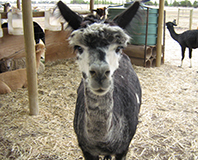Read the latest information on
Foot-and-mouth disease
 Like any traditional livestock industry, the alpaca farming sector face very similar risks of disease and pest incursions, many of which have the capability of impacting the entire industry. And, just like larger farming sectors, the best way to avoid and combat pests and diseases is by having a robust farm biosecurity plan in place to secure your farm and your future.
Like any traditional livestock industry, the alpaca farming sector face very similar risks of disease and pest incursions, many of which have the capability of impacting the entire industry. And, just like larger farming sectors, the best way to avoid and combat pests and diseases is by having a robust farm biosecurity plan in place to secure your farm and your future.
Animal Health Australia (AHA) has teamed up with Charles Sturt University to develop biosecurity resources and emergency animal disease preparedness information for new and emerging livestock industries including the alpaca industry. The information is being made available through the Farm Biosecurity Program.
Alpaca producers are encouraged to visit the alpaca industry webpage on the Farm Biosecurity website where they can get tips about biosecurity through videos, manuals, posters and more. Producers should also subscribe to the monthly e-newsletter, through the link on the top right-hand side of the Farm Biosecurity home page.
What is an emergency animal disease and why do I need to worry?
An outbreak of a serious emergency animal disease (EAD) can be disastrous for producers, causing significant personal stress and anguish as well as financial hardship. Livestock industries can lose sales opportunities both domestically and internationally in the wake of a damaged reputation for our produce, and the broader Australian economy could lose billions in trade and employment.
An EAD is likely to have a significant effect on livestock, potentially resulting in livestock deaths, production loss, and in some cases, impacts on human health and the environment. Diseases such as foot-and-mouth disease (FMD) and tuberculosis are examples of EADs in alpacas. However, the definition also includes unusual, severe outbreaks of established diseases that may cause sudden trade disruptions, such as the 1997 anthrax outbreaks in Victorian dairy cattle. It also includes new diseases where it is not immediately apparent what the disease is, such as the occurrence of Hendra virus in Queensland horses in 1994.
By implementing a biosecurity plan for your alpacas, you are helping to protect yourself, your industry and Australia’s livestock sector from exotic or yet-to-be-identified emergency animal disease outbreaks.
If you suspect a pest or disease outbreak or have seen something unusual in your alpacas and you’re not sure whether it’s an exotic pest or disease, report it. Don’t worry how insignificant it may be. Small signs may be an early indication that something’s wrong.
Suspicions of a serious livestock disease must be reported to your local government vet, your own private vet or a stock inspector. If in doubt, simply call the free Emergency Animal Disease Hotline on 1800 675 888.